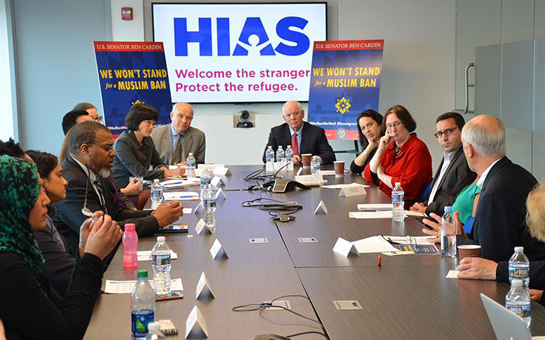The first sixty days of President Trump’s administration are etched with mosque burnings, vandalizing of Jewish graveyards, and violent deaths of immigrants. Muslim Ban 2.0 is widely seen as a slamming of the door on Muslims and refugees. The revised executive order, directly from the desk of the President, implements a complete one-hundred and twenty day moratorium on refugees and restricts travel from six Muslim majority countries.
HIAS, a Jewish organization and one of the country’s oldest refugee resettlement agencies, filed a case -- HIAS v. Trump -- against the ban in a federal court in Maryland. HIAS once stood for “Hebrew Immigrant Aid Society” but since the organization serves refugees from all backgrounds, that meaning has been retired.
America’s refugee programs, which have always had bipartisan support, are lifesaving humanitarian programs that the U.S. has run for decades to offer protection and hope to some of the world’s most vulnerable people.
On March 15, 2017, District Judge Theodore Chuang, in his court in Greenbelt, Md., heard an emergency motion from lawyers the day before the new ban was set to take effect. His motion curtailed parts of the executive order.
Following up on this executive order, several organizations convened a roundtable at the HIAS headquarters in Silver Spring, Md. with Senator Ben Cardin on March 20, 2017, to discuss the illegality and potentially devastating effects of President Trump's proposed travel and immigration bans. The Muslim Link covered the meeting.
“America is losing our moral standing…losing our brand,” stated Senator Cardin, called a “vocal voice for refugees”, to the table of leaders. “We are making America less safe,” he stressed as he shared details of his meeting with the leader of Jordan. Trump’s travel ban is just as purposely offensive and dangerous to Americans as was its illegal predecessor and it is fodder for ISIS recruiters, explained Senator Cardin.
Jameel Aalim-Johnson representing the Prince George’s County Muslim Council thanked Senator Cardin and brought up the issue of the effects of the Muslim Brotherhood designation as a terrorist organization on mainstream Muslim organizations. He expressed the Muslim community’s concerns on how this policy would be weaponized against Islamic organizations by seizing assets and rendering them incapacitated. Aalim-Johnson also said Muslims are experiencing mistreatment at the borders where federal officers are using intimidation and detention as if they have been given carte blanche permission. “We saw Muhammad Ali Jr. detained twice,” Aalim-Johnson reminded the senator.
The Legislative Policy director at ACLU- National, Joanne Lin, echoed these concerns. She shared the story of the former deputy police chief from Alexandria, Virginia, Hassan Aden, who retired after serving as the chief of Police in North Carolina. Aden was detained at New York’s JFK International Airport and treated like a criminal because of his Somali heritage.
Aden wrote in a Facebook post that this experience left him feeling vulnerable and unsure of the future of a country. “This experience makes me question if this is indeed home. My freedoms were restricted…” he wrote after his ordeal.
ACLU also released a resource called People Power, where organizations can post action items on a platform to drum up participation. “This is the resistance movement,” said Lin.
Other refugee service organizations were well represented at the meeting in Silver Spring including International Rescue Committee, the Lutheran Services and Ethiopian Community Development Council, Inc. (ECDC).
Solace Duncan, of ECDC, which serves the Ethiopian Community in Virginia, said the effects of these provisions would have been devastating for those refugees who have time sensitive security checks and remain in danger’s way. “Throughout its 37- year history, the refugee program has enjoyed bipartisan support, as a humanitarian priority for the American people. The overwhelming recent public support for welcoming refugees illustrates that this is still a humanitarian priority for Americans. We urge the administration to continue this bipartisan view,” she urged officials.
Representing CAIR, Dr Zainab Chaudry shared on the ground stories of Marylanders who were affected by the ban. Included amongst them was a 5-year-old boy from the state, who was detained for four hours, without his mother, at Dulles International Airport in the aftermath of the first executive order.
Lakshmi Sridaran, Director of National Policy and Advocacy at South Asian Americans Leading Together (SAALT), noted, “There is an acute relationship between policies and rhetoric that criminalize Muslim, Arab, and South Asian American communities and the hate violence targeting these communities. While the judiciary doggedly blocks the President’s “Muslim Bans,” the damage continues to be done as each week uncovers a new inventory of victims of racially motivated attacks.”
“It starts with leadership. President Trump’s comments as a candidate and a President are just the opposite of what you need,” said Senator Cardin at the roundtable, responding to SAALT’s documenting of ‘over 200 instances of hate violence and xenophobic political rhetoric during this historically divisive election cycle, with 95% of incidents animated by anti-Muslim sentiment and 1 out of 5 xenophobic comments emanating from then-candidate Trump’.
These statistics show that complex refugee and immigration issues need to be addressed by Congress through comprehensive, fair, humanitarian and constitutional legislation, not through bigoted executive orders that give hate mongers the green signal to attack marginalized communities.










Comments powered by CComment